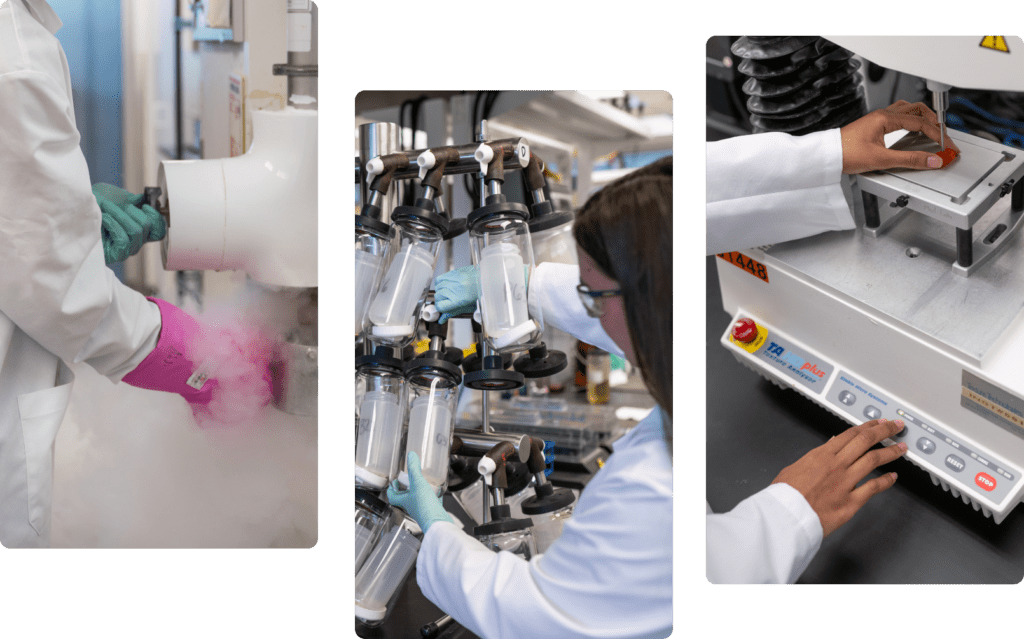Fiber (Insoluble, Soluble, Total - CODEX Definition) Test
-
Price
$585 per analysis
-
Turnaround time
7 - 9 Business Days
-
Rush
Available


Technical data sheet
Method description
Samples (defatted if necessary) are digested with a mammalian alpha-amylase and an amyloglucosidase for 16 hours at 37oC to simulate the human digestive system. Following digestion, the sample is heated to 95oC to denature all enzymes and proteins present and then digested at 60oC with protease. Insoluble digestion resistant material (dietary fiber) is filtered away and the amount of Insoluble Dietary Fiber (IDF) is determined gravimetrically with protein and ash content subtracted (note: protein and ash are determined on the residue). The dietary fiber remaining in solution following the filtration is precipitated with ethanol and is collected in a second filtration step. The amount of dietary fiber collected in the filter is determined gravimetrically with protein and ash subtracted as above and is recorded as the Gravimetric Soluble Dietary Fiber (G-SDF). The filtrate containing the soluble dietary fiber not precipitated by the ethanol is concentrated and analyzed by High Performance Liquid Chromatography (HPLC) to determine the total HPLC-Soluble Dietary Fiber (HPLC-SDF) with a degree of polymerization (DP) greater than or equal to 3 (DP3). The total Soluble Dietary Fiber is calculated as the sum of the Gravimetric-Soluble Dietary Fiber and the HPLC-Soluble Dietary Fiber (SDF = G-SDF + HPLC-SDF). Total dietary fiber is calculated as the sum of the Insoluble Dietary Fiber and the Soluble Dietary Fiber (TDF = IDF + SDF).
Acceptable matrices
Food and Food Ingredients
Unacceptable matrices
Baking powder, Samples containing more than 2% stevia
Limit of quantitation
Total Dietary Fiber - 0.1% Insoluble Dietary Fiber – 0.1% Soluble Dietary Fiber-0.1%
Equipment
General Gravimetric Analytical Chemistry Equipment HPLC-Refractive Index Detector
Method reference
AOAC 2011.25
Reportable unit
%
Sample size requirements
25 g
Information required by submitter
please supply expected estimates. Indicate matrix type, and indicate if samples are high in fat (>5% fat). Indicate whether the sample contains stevia, fructans (inulin or fructooligosaccharides (FOS)), psyllium, flax, and gum (i.e. guar gum)
Additional information
Please include notification for samples containing DP2 and DP3 carbohydrates (Isomalto-oligosaccharides (IMO), Maltiltol, Lactose). Measures total dietary fiber including resistant starch and non-digestible oligosaccharides of DP >3. Dietary Fiber is the portion of the carbohydrates which is not digested in the human gut. It is composed of both soluble and insoluble components. These methods are applicable to all food products; however samples containing psyllium or fructans should be submitted under specific test codes. High-fat (>5%) samples require special handling.
Is this the most suitable fiber test for evaluating my product?
Find your fiber source(s) on the chart and use the alpha reference to see how it aligns with each method. If the alpha reference is fully inside the method circle, that method is optimal for your fiber source(s). If it's outside or touching the circle's edge, the method won't fully capture the fiber. Remember to check applicable labeling regulations for allowed fiber sources.
- AOAC Method 2001.03
AOAC Method 991.43 - AOAC Method 2017.16
AOAC Method 2022.01 - AOAC Method 985.29
AOAC Method 991.43 - AOAC Method 2009.01
AOAC Method 2011.25
-
Cellulose | Beta-Glucan | Psyllium | Gums | Lignin
-
Galacto-oligosaccharides-Raffinose(GOS)/Stachyose
-
Galactomannan | Arabinoxylan | Glucomannan
-
Resistant Starch RS4
-
Resistant Starch RS2 & RS3
-
Pectin | Alginates | Arabinogalactin | Isomalto-oligosaccharide (IMO)
-
Polydextrose | Fibersol®-2 | Resistant Maltodextrins | Soluble Corn Fiber (SCF)
-
Fructans (Inulin, FOS)
-
Cellulose | Beta-Glucan | Psyllium | Gums | Lignin
-
Galacto-oligosaccharides-Raffinose(GOS)/Stachyose
-
Galactomannan | Arabinoxylan | Glucomannan
-
Resistant Starch RS4
-
Resistant Starch RS2 & RS3
-
Pectin | Alginates | Arabinogalactin | Isomalto-oligosaccharide (IMO)
-
Polydextrose | Fibersol®-2 | Resistant Maltodextrins | Soluble Corn Fiber (SCF)
-
Fructans (Inulin, FOS)
-
Cellulose | Beta-Glucan | Psyllium | Gums | Lignin
-
Galacto-oligosaccharides-Raffinose(GOS)/Stachyose
-
Galactomannan | Arabinoxylan | Glucomannan
-
Resistant Starch RS4
-
Resistant Starch RS2 & RS3
-
Pectin | Alginates | Arabinogalactin | Isomalto-oligosaccharide (IMO)
-
Polydextrose | Fibersol®-2 | Resistant Maltodextrins | Soluble Corn Fiber (SCF)
-
Fructans (Inulin, FOS)
-
Cellulose | Beta-Glucan | Psyllium | Gums | Lignin
-
Galacto-oligosaccharides-Raffinose(GOS)/Stachyose
-
Galactomannan | Arabinoxylan | Glucomannan
-
Resistant Starch RS4
-
Resistant Starch RS2 & RS3
-
Pectin | Alginates | Arabinogalactin | Isomalto-oligosaccharide (IMO)
-
Polydextrose | Fibersol®-2 | Resistant Maltodextrins | Soluble Corn Fiber (SCF)
-
Fructans (Inulin, FOS)
Common Fiber (Insoluble, Soluble, Total - CODEX Definition) Test Testing Questions
While our sales and customer service team are happy to answer general testing questions, consultations typically start at a rate of $250 per 30 minutes regarding the interpretation of reported test results or questions about our test methods. We cannot consult on regulations, tolerance limits, or claims.
We make every effort to keep our methods and detection limits up to date according to the latest standards and qualifications. If you have any questions regarding the limit of detection/quantification or method references, please contact our Customer Service team at 1-800-245-5615.
Our standard turnaround time is 10 business days for most assays. There are some assays that require a longer turnaround time. We also offer a RUSH service that is half the time of the standard turnaround time of the assay at double the cost of the assay. A few assays that we provide cannot be rushed due to the nature of the test. Please check the specific assay you are interested in regarding the ability to RUSH the turnaround time.
Medallion Labs, a division of General Mills, offers multiple areas of expertise for analytical testing and product evaluation for the food and ingredient industry. Our areas of expertise include Chemical Analysis, Nutritional Analysis, Food Safety, Shelf Life Studies, Microbiology, Specialty Fibers, Physical Testing, Allergen Testing, as well as Product Evaluation (which includes Product Performance and Sensory Evaluation) and Technical Consulting/Method Development. Our methods are developed for the testing of food products and ingredients.
Do you have a more specific question?
Our food testing experts are here to help.
"*" indicates required fields

Helpful content related to Fiber (Insoluble, Soluble, Total - CODEX Definition) Test
Let’s Get to Work!
Submit your order online and ship your samples today. If you have questions, we are always here to help.
Medallion Labs
A food testing program designed with mid-market and enterprise food and ingredient manufacturers in mind.
